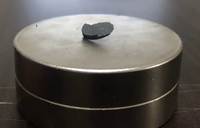
Photo from wikipedia
Abstract Fabrication of 3D nanoarchitecture is one of the effective ways to improve performance of energy applications because it has advantages such as buffer space accommodating volume expansion or high… Click to show full abstract
Abstract Fabrication of 3D nanoarchitecture is one of the effective ways to improve performance of energy applications because it has advantages such as buffer space accommodating volume expansion or high surface area leading to higher efficiency. However, the fabrication of such nanoarchitectures is generally complex involving several steps including patterning, etching and growth of intermediate materials. Herein, we report a facile process to form a nanoarchitecture of copper phosphide (Cu3P) nanosheets directly on copper foil by epitaxially growing Cu3P sheets of controlled thickness on a suitably engineered Cu foil. The growth of Cu3P nanosheets and their epitaxial relationship with the Cu foil were studied by X-ray diffraction (XRD) and transmission electron microscopy (TEM). To show the advantages of nanoarchitecture, we tested both nanoarchitecture and film-like morphology of Cu3P as an anode in lithium-ion battery (LIB) and an electrocatalyst in hydrogen evolution reaction (HER). We found that the nanoarchitecture enabled significant improvements in both capacity and rate capability of the LIB. In the case of HER, however, the higher electrocatalytic efficiency of the nanoarchitectured electrode was maintained only in the initial cycles due to morphology reconstruction of Cu3P during HER. This result provides a new facile route to fabricate nanoarchitecture and shows superior performance of the nanoarchitecture in energy applications.
Journal Title: Surfaces and Interfaces
Year Published: 2021
Link to full text (if available)
Share on Social Media: Sign Up to like & get
recommendations!